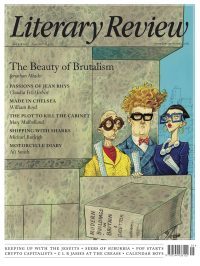Alexandra Gajda
Method in the Melancholy
The Elizabethan Mind: Searching for the Self in an Age of Uncertainty
By Helen Hackett
Yale University Press 405pp £25
The year 1600, writes Helen Hackett in her ambitious study of the mental world of the Elizabethans, was ‘a moment of the mind’. Around the turn of the 17th century, an unusually rich crop of literary works was published and performed that took as their principal subject the nature of the mind and mental processes, character and self, and the impact of ‘passion’ (in other words, emotion) on human thought and action. Among the products of this great age of literary flourishing were Ben Jonson’s ‘humours’ plays, which made comedy out of the ancient notion that bodily humours reified character, Thomas Wright’s The Passions of the Mind (1601), a systematic handbook on the management of the emotions, and John Florio’s translation of Montaigne’s Essays (1603), which unabashedly set up the autobiographical ‘self’ as a subject for philosophical and literary analysis (‘myself am the groundwork of my book’, wrote Montaigne). Most famous of all, of course, are the existential ruminations of Hamlet (c 1599–1601), analysis of which inevitably features in the preface and the conclusion of Hackett’s book.
Hackett argues that a confluence of technological, educational, religious and philosophical developments nurtured this novel concern with selfhood and the processes of thought and feeling in the later 16th century. As the printing press came of age, medical treatises popularised remedies for discontented mental states caused by the

Sign Up to our newsletter
Receive free articles, highlights from the archive, news, details of prizes, and much more.@Lit_Review
Follow Literary Review on Twitter
Twitter Feed
Margaret Atwood has become a cultural weathervane, blamed for predicting dystopia and celebrated for resisting it. Yet her ‘memoir of sorts’ reveals a more complicated, playful figure.
@sophieolive introduces us to a young Peggy.
Sophie Oliver - Ms Fixit’s Characteristics
Sophie Oliver: Ms Fixit’s Characteristics - Book of Lives: A Memoir of Sorts by Margaret Atwood
literaryreview.co.uk
For a writer so ubiquitous, George Orwell remains curiously elusive. His voice is lost, his image scarce; all that survives is the prose, and the interpretations built upon it.
@Dorianlynskey wonders what is to be done.
Dorian Lynskey - Doublethink & Doubt
Dorian Lynskey: Doublethink & Doubt - Orwell: 2+2=5 by Raoul Peck (dir); George Orwell: Life and Legacy by Robert Colls
literaryreview.co.uk
The court of Henry VIII is easy to envision thanks to Hans Holbein the Younger’s portraits: the bearded king, Anne of Cleves in red and gold, Thomas Cromwell demure in black.
Peter Marshall paints a picture of the artist himself.
Peter Marshall - Varnish & Virtue
Peter Marshall: Varnish & Virtue - Holbein: Renaissance Master by Elizabeth Goldring
literaryreview.co.uk